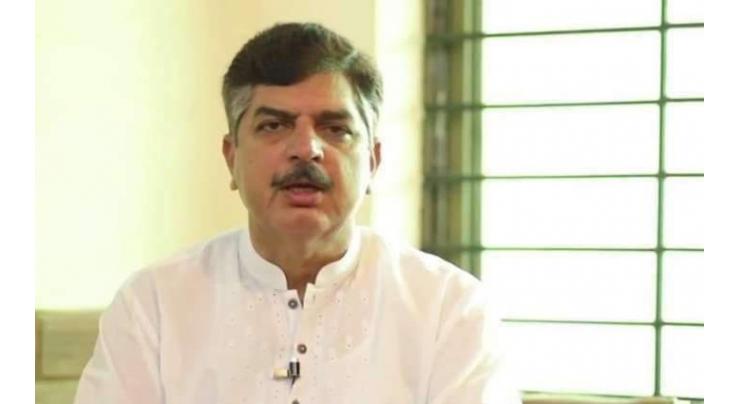
Inexpensive Electricity Govt's Priority: Energy Minister
Muhammad Irfan Published March 16, 2020 | 11:05 PM

Punjab Minister for Energy Dr. Akhtar Malik said on Monday that generation of inexpensive electricity through all resources was top priority of the government and various projects were well on way in this regard
LAHORE, (UrduPoint / Pakistan Point News - 16th Mar, 2020 ) :Punjab Minister for Energy Dr. Akhtar Malik said on Monday that generation of inexpensive electricity through all resources was top priority of the government and various projects were well on way in this regard.
He was talking to business community here at Lahore Chamber of Commerce & Industry (LCCI) where LCCI President Irfan Iqbal, Senior Vice President Ali Hussam Asghar, Vice President Mian Zahid Jawaid Ahmad, former president Sohail Lashari and former SVP Mian Nauman Kabir also spoke on the occasion.
The Provincial Minister said, government was focusing renewable energy sector and no new fossil-fuel-run plant would be installed from now on, asserting that 7,000 schools in Punjab had been switched over to solar energy,while Memorandum of Understandings (MOUs) had also been signed with 13 universities. "Investors from private sector are invited to produce low-cost energy through solar resource to be purchased by universities as per their requirement," he added.
He said that two villages having 500 houses each had also been shifted to bio-gas and solar energy, adding that two wind power plants had been installed in Joharabad.
Dr. Akhtar Malik said that in the past, governments had made costly and long term agreements with IPPs to produce energy, while some agreements would expire in year 2023 and some in 2032 therefore new agreements would be re-negotiated after expiration.
Various sites had however been identified for mini hydel power projects of one megawatt and above, he mentioned. While inviting the private sector to invest in these projects, he said, government would provide all facilities to investors so they should invest and produce cheap electricity for industrial sector.
Provincial Energy Minister said, government was promoting net metering and front desks were also being established at all DISCOs (power Distribution Companies) to encourage people to produce their own electricity through solar means, while a testing laboratory had been established near Kala Shah Kaku for testing of solar panel quality.
On this occasion, LCCI President Irfan Iqbal Sheikh said that Punjab contributed around 55 per cent to GDP and accounts for about 68 per cent of electricity demand in the country.
"Energy is a basic input of industrial production and vital component of investment. Though Pakistan has enhanced its power generation capacity considerably in recent years, we are still far behind from an optimal energy mix as a heavy percentage of our energy is still generated through thermal sources while the share of renewable energy (solar, wind and hydro power) is very low," he maintained.
Apart from environmental concerns, he added, huge dependence on expensive thermal power generation resulted in tariff hikes, subsidies, circular debt, inefficiencies which hampered competitiveness of Punjab's industrial sector. "We would like to focus solar power as Punjab has considerable sunshine available for more than 300 days (approximately) in a year. We recommend the installation of small solar power projects at all public sector buildings including offices and education institutions. Industries should also be incentivized to install solar panels for self-consumption," he added.
Punjab also had abundance of resources in bagasse, biomass, cow-dung and municipal waste, which could be tapped for development of power generation projects in the province, he suggested.
Irrigation canals and barrages in Punjab provide an opportunity for low-head hydro projects, he said, asserting that to fulfill demand of domestic and industry through renewable resources, there was a need to attract private sector investment.
LCCI President suggested Punjab government to develop a mechanism for public private partnership and design special financing models to enhance private sector's access to finance in this regard.
Related Topics
Recent Stories

HEC reviews curricula for environmental sciences degree programme

ICC Asia looking forward to an action-packed Asia Cricket Week

Yuvraj Singh named ICC Men’s T20 World Cup 2024 Ambassador

Greece hands Olympic flame to 2024 Paris Games hosts

Two Kyiv hospitals evacuating over feared Russian strikes

World must act on neurotech revolution, say experts

Charles & Catherine's cancer diagnoses

Champions Alcaraz and Sabalenka through in Madrid Open

King Charles to resume some public duties during cancer treatment: palace

US defense chief announces $6 bn in security aid for Ukraine

Heavy rains cause damage to Spezand-Taftan railway track

Woman stabbed in Israel, attacker killed: police
More Stories From Business
-

Finance minister reviews progress on FBR digitalization
7 hours ago -

US stocks rebound on tech earnings, London hits new record
7 hours ago -

US approves gene therapy treatment for hemophilia
6 hours ago -

KATI president for inclusion of agri sector in tax net
6 hours ago -

Ahsan chairs 13th CPEC-JCC preparatory meeting, reviews arrangements for high-level delegation’s v ..
8 hours ago -

Police to take every step for security of business community: IGP
8 hours ago
-

WB director, Planning minister discuss reforms in development projects
8 hours ago -

IP rights crucial in achieving SDG : Jam Kamal
10 hours ago -

FBR’s data protection efforts commended by OECD assessment team
9 hours ago -

US stocks rebound on tech earnings, London hits new record
10 hours ago -

SECP-IFSB workshop highlights Pakistan's progress in Islamic Finance Development
10 hours ago -

SBP to announce monetary policy on April 29
10 hours ago

















